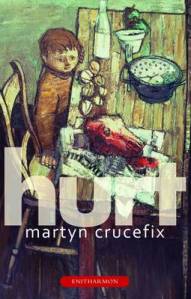Published by Enitharmon Press 2010: here is Martyn reading poems from this collection at London’s South Bank Centre
Critical Views:
“This is a wonderful book of poems – charged with a quiet intensity, with a sense of drama filtered by intelligence. The poems speak with a voice of battle-weary, passionate celebration. It seems to me it is concerned with meditating upon both the spiritual and physical worlds (both of mankind and nature), upon the conflict between life and death, youth and age, change and lack of change [. . .] Time, craft and the fires of experience fuel this collection of poems. This is a book which gradually fascinates. You don’t notice each poem falling in step with you and then you suddenly find it has grabbed you by the collar and is leading you somewhere important, somewhere that matters…” Mike Loveday, Eyewear. Read the full review here.
“From first to last, Martyn Crucefix’s impressive fifth collection offers writing of quality and worth. Arranged in three sections, its fifty-one thematically and stylistically varied poems nevertheless achieve a telling unity in both the seriousness of their subject matter and the poet’s exact and detailed observation of it [. . . ] Hurt investigates important questions, some merely difficult, others imponderable. Ken Head, Ink, Sweat and Tears. Read the full review here.
“Martyn Crucefix is concerned in his new collection Hurt with how human beings relate, though his collection considers pain and how it separates us rather than unites us [. . . ] and, like Rilke, his language is intense, compressed and vivid. Zoe Brigley, Magma.
‘Water lily’ from Hurt in Poetry London: here. – ‘He considers what the young have to teach’ from Hurt on Verse Daily: here. – ‘While there is war’ from Hurt in The Cortland Review (USA): here. – ‘Growth of a poet’s mind’ from Hurt in Bowwowshop: here. – ‘Can Torras’ and ‘Cell’ from Hurt can be read at nth position web site.
Blurb
Nightjars, lilies, beetles, poems by Stalin, Whitmanesque despatches from an American war, the flight of refugees, ambiguous revolutionary cells, Homer’s Ithaca, the lives of Petrarch and Keats.
Such items fill the table-top.
But the boy does not climb to it.
He does not clamber down and away.
Despite everything, the boy
seems prepared to stand there
counting.
The tensions that animate Martyn Crucefix’s fifth collection are those between openness and closure, vulnerability and defiance, liberal and fundamentalist. Bearing the impress of his acclaimed translations of Rilke’s Duino Elegies, this book moves towards an openness to experience that is always threatened by the facts of suffering. Less about what hurts us, more how we respond to it, the reader is carried towards an affirming, comprehensive vision that declares “this, this is mine”.
From this collection:
Riders on the storm
With no schedule to drive us,
we wait for rain to stop beside Ullswater’s
southern lip, for the landlord of The White Lion
to determine when it’s time to open.
Ducking through the door, Helen, Clive, Steve,
each a few weeks shy of university,
and I’m there too, heart awash
with absence, her love letters at looked-for drops,
the girl I feel leaving gradually
as the tedious route past Thirlmere to Catstye.
But it’s OK for a while – passing midday snug
in a deserted pub
while outside the downpour gurgles, begins to blur
and double with the torrential roar
of the juke-box: The Doors the only thing
we key in, its electric piano’s limpid fingering
like the give and tender recoil of water,
the lugubrious voice . . . Fifteen years later,
at his paint-spattered Pere-Lachaise stone,
I remember that wretched lunchtime
under the wettest rain in England,
when I was too ill-formed to understand.
I barely displaced a drop of local weather,
could only conceive of myself as either
a body slumped beside a dry stone wall
or drenched and raging on the dramatic fell
on the path to Ambleside bus station,
its oily tarmac smoking under black rain,
her blonde voice fluent on the phone:
‘You hear me?’ I could not even hear my own.
x
Keats
A building site apparently,
though we all resist,
prefer the pastoral
of nightingale and musk rose
x
as he lay upstairs,
listening to Brown banging
the servant-girl by the door,
her little repeated cries.
x
And the one star sank
in the adjoining house.
Her sigh, odour, distance
each a reason why
x
the hoops of suffering
must bring us to ourselves.
Or perhaps a premonition:
the boat’s keel cutting
x
the Neapolitan harbour,
too sick to wonder,
but listening constantly –
the sounds of this house.
x
A hammer and a nail.
Shouts of workmen busy
with the elevation of wealth.
And still he listens
x
leant now on a pillow,
the clock’s iambic tick-
tock ahead of him still,
limping perfectly along.
